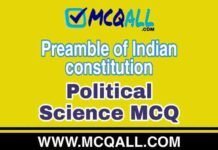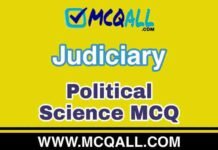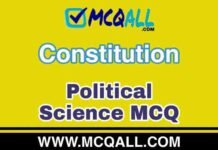Constitution Miscellaneous – Political Science MCQ Question and Answer
Constitution Miscellaneous – Political Science MCQ Question and Answer : Constitution Miscellaneous – Political Science MCQ Question and Answer is given below. This Constitution Miscellaneous – Political Science MCQ / Constitution Miscellaneous – Political Science Quiz / Constitution Miscellaneous – Political Science Question and Answer / Constitution Miscellaneous – Political Science Multiple Choice Question, Short Question, Question and Answer, Suggestion, Notes are very important for school, college and various competitive or job exams and interviews.
Those of you who are looking for Constitution Miscellaneous – Political Science MCQ Question and Answer, can read the questions and answers given below.
Constitution Miscellaneous – Political Science MCQ
- Which one of the following Statement about the State Governors is not true ?
(A) He is part of the State Legislature
(B) He can pardon a sentence of death
(C) He does not appoint Judges of the State High Court
(D) He has no Emergency powers
Answer : He can pardon a sentence of death
Solution: According to Article 155 of Indian Constitution, the Governor of state shall be appointed by the President. Article 154(1) says that Governor is the head of State Executive and Governor hold office during pleasure of President Article 156(1) and hold office for normally 5 years Article 156(2). Thus all statements are correct.
- According to which Article of Constitution of India, the Chief Minister is appointed by the Governor of a State ?
(A) Article 163
(B) Article 164
(C) Article 165
(D) Article 166
Answer : Article 164
Solution: According to Article 164, the Chief Minister shall be appointed by the Governor and the other Ministers shall be appointed by the Governor on the advice of the Chief Minister, and the Ministers shall hold office during the pleasure of the Governor. The Chief Minister and other Ministers are not selected by the Governor.
- When the Supreme Court issues a writ to a person or to an institution to perform its duty, it is called –
(A) Certiorari
(B) Mandamus
(C) Quo Warranto
(D) Habeas Corpus
Answer : Mandamus
Solution: A writ of Mandamus (which means “we command” in Latin), or sometimes mandate, is the name of one of the prerogative writs in the common law. It is issued by a superior court to compel a lower court or a Government officer to perform mandatory or purely ministerial duties correctly.
- Under which Article of the Constitution of India, Taxes are levied and collected by the center but distributed between the center and the States ?
(A) Article 268
(B) Article 269
(C) Article 270
(D) Article 271
Answer : Article 270
Solution: According to Article 270 of the Indian Constitution,Taxes on income other than agricultural income are levied and collected by the government of India and distributed between the Union and the States.
- Under Art. 352 of the Constitution of India, an emergency can be declared if security of any part of India is threatened by
- War
- External aggression
- Armed rebellion
- Internal disturbance
Selected the correct answer from the code given below :
(A) 1 and 2 only
(B) 2, 3 and 4
(C) 1, 2 and 3
(D) 1, 3 and 4
Answer : 1, 2 and 3
Solution: Under Article 352 of the Constitution if the President is satisfied that a grave emergency exists, whereby the
emergency exists, whereby the security la or any part of the Territory thereof is threatened, either, by war, external aggression or armed rebellion, he can declare the National Emergency. The word Internal
disturbance’ has been replaced by ‘Armed rebellion ‘ in 44thAmendment (1978) of the Constitution.
- Generally, in India Finance Commission is appointed for every five years –
(A) To determine the financial position of the States.
(B) To determine the financial position of Central Government.
(C) To determine the financial resources of Central Government.
(D) To determine the share of the States in the grants and revenues of the Central Government.
Answer : To determine the share of the States in the grants and revenues of the Central Government.
Solution: Article 280 of the Constitution provides for the formation of the Finance Commission after the expiration of every fifth year or at such earlier time as President considers necessary. Its main function is to submit recommendations to the President regarding the allocation of net proceeds of taxes between the Union and the States and the method of distribution among the States. It may be mentioned that the first Finance Commission was set up on November 22, 1951, in the Chairmanship of K.C. Niyogi. The Committee had submitted its recommendations in 1953.
- Planning Commission was established by –
(A) Issuing ordinance by the President
(B) Making a law by Parliament
(C) A special resolution passed by the Union cabinet
(D) None of the Above
Answer : A special resolution passed by the Union cabinet
Solution: The Planning Commission was a non-Constitutional institution. It is not mentioned in the Constitution. The Commission was formed by a resolution of the Cabinet on March 15, 1950. Prime Minister used to be the Chairman of this Commission. Its main function was to prepare a 5 year plan for the Union and to give suggestions on annual plans of the States. Almost 70 percent grants to the States by Centre were given on the recommendation of the Commission. NITI Aayog has replaced the Planning Commission. It is also an extra-constitutional body. It has been formed by a resolution of the Cabinet on 1 January, 2015.
- The Administrative Reforms Commission 1967, which for the first time recommended for the setting up of Lokpal and Lokayukta, was headed by
(A) Morarji Desai
(B) K. Santhanam
(C) Chaudhary Charan Singh
(D) Babu Jagjivan Ram
Answer : Morarji Desai
Solution: The establishment of Lokpal and Lokayukta in India was recommended by the first Administrative Reforms Commission. This Commission was set up on January 5, 1966 in the Chairmanship of Morarji Desai. Later in 1967, K. Hanumanthaiah was appointed as its Chairman. The term of the Commission ended in 1970.
- Chief Election Commissioner can be removed from his office by –
(A) Chief Justice of Supreme Court
(B) The President
(C) Provision of the Cabinet
(D) 2/3 majority of the members of both the Houses of the Parliament on the basis of proven misconduct.
Answer : 2/3 majority of the members of both the Houses of the Parliament on the basis of proven misconduct.
Solution: The Chief Election Commissioner cannot be removed from his post easily on account of any political reasons. . Chief Election Commissioner of India can be removed from his office by the Parliament with a two-thirds majority in both the Lok Sabha and the Rajya Sabha on the grounds of proved misbehavior or incapacity.
- Which of the following parties were formed by Dr. B. R. Ambedkar?
- The Peasants and Workers Party of India
- All India Scheduled Castes Federation
- The Independent Labour Party.
Select the correct answer from the codes given below:
(A) 1&2 Only
(B) 2 & 3 Only
(C) 1&3 Only
(D) 1, 2 & 3
Answer : 2 & 3 Only
Solution: Dr. Ambedkar founded Samata Sainik Dal, Independent Labour Party (1936), Scheduled Castes Federation (1942) and Depressed Classes Federation (1930). The Peasants and Workers Party of India was founded in 1947 in Maharashtra. It was a Marxist Political party. While the Workers and Peasants Party (PWP) was founded on November 1, 1925 by Kazi Nazrul Islam, Hemant Sarkar, Shamsuddin Hussain and Qutubuddin Ahmad . It was not founded by Dr. Ambedkar. It worked under Indian National Congress during 1925 to 1929.
Political Science MCQ Question and Answer
See also: – Political Science MCQ Question and Answer Click Here
Constitution Miscellaneous – Political Science MCQ Question and Answer
Constitution Miscellaneous – Political Science MCQ Question and Answer: Constitution Miscellaneous – Political Science MCQ Question and Answer – Constitution Miscellaneous – Political Science MCQ Question and Answer has been discussed above.
Constitution Miscellaneous – Political Science Multiple Choice Question and Answer
Constitution Miscellaneous – Political Science Multiple Choice Question and Answer: Constitution Miscellaneous – Political Science Multiple Choice Question and Answer – Constitution Miscellaneous – Political Science Multiple Choice Question and Answer discussed above.
Constitution Miscellaneous – Political Science Quiz
Constitution Miscellaneous – Political Science Quiz : Constitution Miscellaneous – Political Science Quiz – Constitution Miscellaneous – Political Science Quiz has been discussed above.
Constitution Miscellaneous – Political Science Question and Answer in English
Constitution Miscellaneous – Political Science Question and Answer in English: Constitution Miscellaneous – Political Science Question and Answer in English – Constitution Miscellaneous – Political Science Question and Answer in English.
Constitution Miscellaneous – Political Science MCQ Question and Answer
If you benefit from this “Constitution Miscellaneous – Political Science MCQ Question and Answer” post then our efforts will be successful. Also visit our MCQALL.COM website or follow us on various social networking sites (Telegram, Facebook, Youtube, Instagram, Twitter) to know MCQ – Multiple Choice Question Quiz on various topics, questions and answers quiz from GK and Daily Current Affairs. Thank you.












